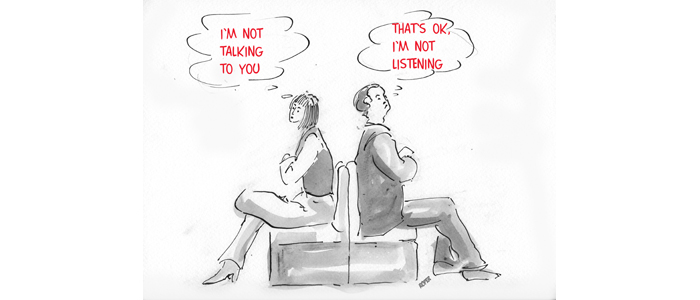If you think that asking closed questions as a leader will provide you with the right answers, you should think again. Here we look at an alternative mode of questioning, which empowers people to find the answers themselves.
“I don’t pretend we have all the answers. But the questions are certainly worth thinking about.”
Arthur C. Clarke
One of the most important skills you can learn as a leader is to listen. Asking questions doesn’t necessarily make you a good listener, because however good you are at asking questions, you are by definition coming from your own side of the track – you are thinking about what you need to know and what information you’d like to find out.
However, there are ways of asking questions that are better than others. Most of us are familiar with the distinction between closed and open questions: closed questions result in a ‘yes/no’ answer or in a piece of specific information: “What is your name?” is a closed question. These questions can be useful to slow someone down, or close a conversation, but they will kill an open-ended conversation or interview.
For many of us, our education has taught us to ask lots of closed questions. Experienced and educated leaders often feel that part of what they are there for is to know the answers and get to them as quickly as possible, and in seeking information or troubleshooting a problem it often seems that the quickest way to a solution is to drill down by asking closed questions.
However, in the area of engaging and motivating people, empowering them to find the answers themselves, or building truly durable solutions rather than quick fixes – all skills needed in developing and growing a healthy and sustainable organisation – it helps to have an alternative mode of questioning – and some questions are more open than others!
Open questions
The usual guideline is that open questions begin with the words when, where, how, why, what, and who, but it’s not always quite as simple as that. As you can see from these examples, you can still ask closed questions using these words:
-
-
-
- “When were you born?”
- “Where were you when the accident happened?”
- “How did you store the explosive?”
- “Why were you in the kitchen yesterday evening?”
- “What’s your favourite colour?”
- “Who is your role model?”
-
-
It often seems to me that I get results with people in direct correlation with the quality of the questions I ask them, and I sometimes spend a lot of time working out exactly the right way to pose a question to a client or group.
Here are some wonderful questions for finding out more about people and what motivates them:
To find out about their goals and aspirations:
-
- “How will you know when you have achieved that goal?”
- “What will your life be like when you are able to…?”
- “What will you see? Hear? Feel? (when the goal is achieved)
- “How will you feel when the problem is solved?”
To examine current reality and their reality
-
- “What is happening now? What…Who…When…How often?”
- “Where does the problem lie, in the task or how you feel about it?”
- “What did you make that mean?”
- “What rules or assumptions are you using that could be challenged?”
- “What is the effect or result of that?”
- (In answer to “I don’t know”): “I know you don’t know, but if you did know?” (a weirdly effective question, this one!)
To help someone explore all their options:
-
- “What do you think you could do in this situation?”
- “How would you deal with this if you were (a guru, a hero, the best manager in…)?”
- “What would you do if (your bonus, job, life etc.) depended on your solving this issue?”
- “What would you do now if you were already the person you know you have the potential of becoming?”
- “What else could you do?”
- “What would you do now if you knew you could not fail?”
- “What if (this or that constraint) were removed?”
- “What are the benefits and downsides of each option?”
- “What factors will you use to weigh up the options?”
To establish their motivation and level of commitment:
-
- “So what will you do now, and when?”
- “Will this address your goal?”
- “If you could have this right now, on a plate, would you take it?”
- “How likely is this option to succeed?”
- “What might stop you from achieving your goal?”
- “What might it be useful to believe?”
- “How will you overcome this?”
- “What needs to happen for….?”
- “What resources do you need to support you in this?”
- “What’s your first step? Second? Third?”
- “On a scale of 1 to 10 how compelled are you to do this?”
Some hints
- When you’ve asked a good open question, leave a long silence. It will seem embarrassingly long to you, but the person you have asked the question of needs the time to think – and I promise you, the silence won’t seem half as long to them as it will to you.
- Resist the temptation to follow up your initial question with more questions – they’re still thinking about your first question. The urge to do this comes from embarrassment – hold your nerve.
- Start collecting good questions, and keep a list of the best. Until you are very skilled your mind will tend to go blank in the heat of a conversation or interview, and your instinct will be to fill the void with a quick (closed) question. Keep a list in your folder or tablet and have them discreetly in front of you.

